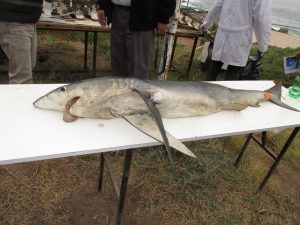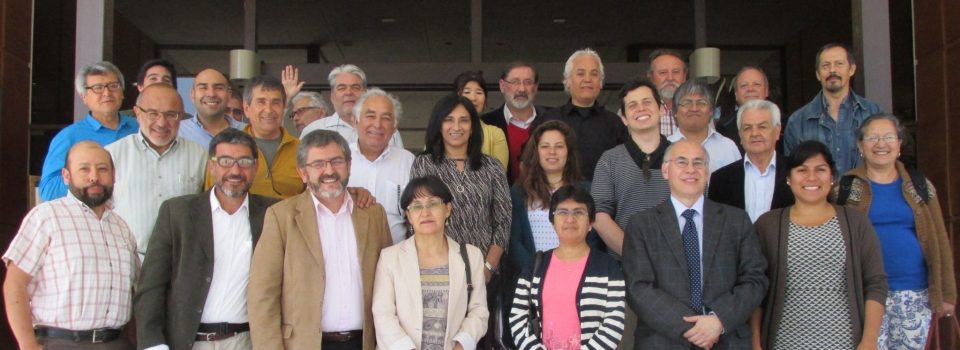Chile and Peru work together on ecological and fisheries issues
November 17th, 2016
Between November 8 and 10 in Viña del Mar, the third Binational Workshop on biological fishery studies was carried out on top and highly migratory predators in the South Pacific Ocean. It is organized by the Instituto de Fomento Pesquero (IFOP), the Instituto del Mar del Perú (IMARPE) and the GEF Humboldt project towards an ecosystem approach of the large marine ecosystem of the Humboldt Current.
In the activity, researchers from IMARPE from Peru and from Chile: Subsecretaría de Pesca, from Instituto de Fomento Pesquero, Servicio Nacional de Pesca and academics from the universities: Católica del Norte, Andrés Bello, from Concepción, Arturo Prat, Católica de la Santísima Concepción.
The objective is to expose and disseminate biological studies carried out in both countries on top predators and highly migratory species, on distribution issues, concentration and inter-specific relations and in relation to studies on trophic relationships of top predators.
Researcher Patricio Barría of IFOP referred to the workshop: “the large marine ecosystem of the Humboldt Current, there is a high biological production and supports 20% of the world catches, mainly small pelagic fish sardines, horse mackerel and anchovy; in the top level of these trophic plots, the man is who with his fishing activity extracts matter and energy and sustains important economic activities. In addition, at the top levels of the trophic levels, there are other top predators such as birds, mammals, cetaceans, sea turtles and highly migratory fish species such as swordfish, parakeet / goldenfish, large tunas, sharks and cephalopods. Many of these species constitute target fisheries for high-level international fisheries and coastal states and other species are incidentally captured as companion fauna.
The systems of sampling and data collection in the fisheries of both countries and the surveys carried out by the Scientific Observers in different fishing fleets (longline, cortina, trawler, purse-seine) have been fundamental since they have made possible incipient trophic studies and development of trophic plots of pelagic and coastal ecosystems. Many of these researches have been developed at different spatial and temporal scales, with different methodologies and technological developments in both countries. The purpose of this workshop is to bring together Chilean and Peruvian researchers to establish a research network, update their knowledge and develop joint research aimed at increasing scientific knowledge in the region. And on the other hand, in the medium term, transform this knowledge into models as useful tools for the management of natural resources either for the resolution or mitigation of ecological, economic and social problems, as well as to understand the structure and functioning of this great marine ecosystem, which provides important goods and services to both countries.”
Marilú Bouchon, of IMARPE, explained “this workshop is an opportunity to meet with Chilean colleagues, we are now trying to unify criteria for the study of predators, and following the methodology of previous years, to be able to go deeper into trophic chains of predators; this has a common goal: both countries want to continue to collaborate, to strengthen the knowledge of the Humboldt system. The workshop is perfect since we are getting to know Chile’s research and sharing research from Peru. We hope that the ties will become more solid and open the links for joint research. ”
Antonio Palma, of Servicio Nacional de Pesca, added: “The workshop is very important, the details that are being delivered here on top predators, many of them cetaceans and therefore become part of what will see the Fisheries Act in its last A modification that will give an ecosystemic approach to fishing activity and to top predators; sharks, whales. It is essential to work with Peru as we share the ecosystem and, therefore, the agreements must be overall, so the fisheries are to be addressed in their entirety. This is one more link than the GEF project proposes to carry out joint actions for the common good and health of the Humboldt current ”
Francisco Ponce, of Subsecretaría de Pesca, said “the workshop is planned in the GEF Humboldt activities and the objective is the exchange of information between researchers from Chile and Peru, to see the methodological advances being made in research topics In different groups of top predators, we have seen fish, birds and mammals. The exchange implies that we can leave all the studies reflected in some memory.”
Marianela Medina, academic at Arturo Prat University, complemented “work in the area of trophodynamics in pelagic fish, ie, who eats whom, predation; who are the prey and who the predators, what happens in the Humboldt ecosystem with this subject, I consider that we must continue to advance more in the generation of knowledge with our Peruvian colleagues and try to standardize methodologies.”
